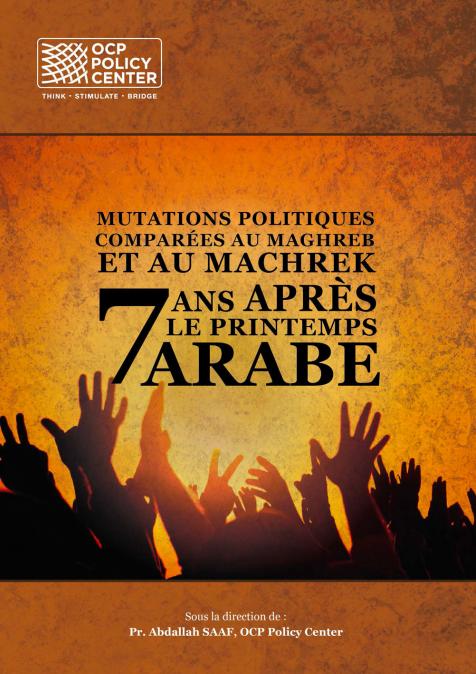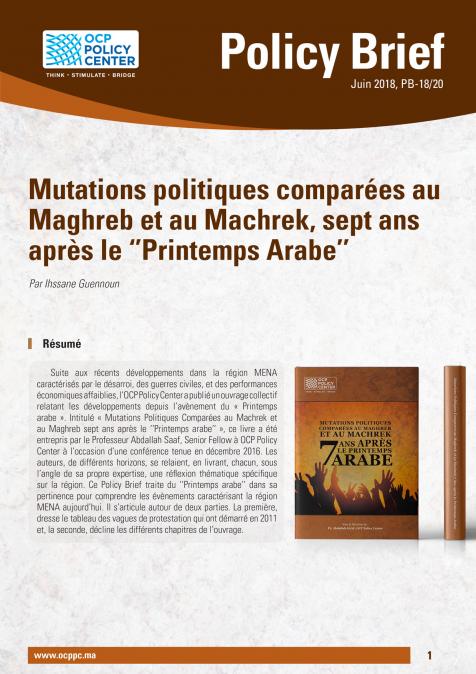Publications /
Opinion
The Middle East and North Africa (MENA) region is characterised by its diversity in political systems, economic conditions, and social structures. It is home to a mix of high-income countries such as Qatar, Saudi Arabia, and the United Arab Emirates, as well as low-income and conflict-affected states like Yemen and Iraq. This diversity creates a complex environment for think tanks. Political instability in some areas, coupled with economic uncertainty, presents a challenging landscape for think tanks to operate effectively and influence policy. However, these very challenges also highlight the critical need for independent research and policy advice to navigate these complexities.
Think tanks in the region have emerged as key players in informing policy and fostering dialogue, often filling the gap left by weak public institutions. From major regional actors like the Policy Center for the New South (PCNS) in Morocco, which emphasises long-term development strategies and South-South cooperation, to smaller local entities focusing on niche issues, MENA think tanks vary widely in focus areas and strategic priorities. PCNS, for example, has positioned itself as a leader in geopolitical and economic research, fostering strategic discussions on Africa’s place in the global economy and the region’s evolving political landscape.
This analysis draws on data from the Think Tank State of the Sector 2024 survey, which includes responses from think tanks across the MENA region, covering countries such as Egypt, Iraq, Israel, Jordan, Lebanon, Qatar, Saudi Arabia, Tunisia, the United Arab Emirates (UAE), and Yemen. The data provides valuable insights into how think tanks in the region are functioning, their focus areas, and the challenges they face. Below, we highlight key trends that reveal the strengths and opportunities for growth within the MENA think tank sector.
Download the On Think Tanks State of Sector Report 2024
The Growing Importance of Policy Influence
One of the most significant findings from the survey is the increased use of policy briefs and public events as key tools for influencing decision-makers. In a region marked by rapid changes and complex governance systems, think tanks are stepping up to provide research-based insights on issues such as economic reforms, social development, and environmental sustainability.
However, the methods and strategies used to disseminate research vary significantly. In countries with more open political environments, think tanks are able to engage actively with a variety of stakeholders, including government agencies, international organisations, and civil society. In contrast, think tanks operating in more restrictive environments, often face limitations on public engagement and must rely on more discreet channels to communicate their findings.
An example of successful policy influence can be seen in PCNS’s role in promoting economic development and regional integration within Africa. By producing in-depth research reports and organising high-level forums that bring together policymakers and international experts, PCNS has helped shape discussions on economic policies and the future of governance in the region.
According to the survey, 93% of think tanks in the MENA region produce policy briefs, while 80% organise public events. These figures highlight the strategic role think tanks play in shaping policy conversations. Through policy briefs, think tanks distil complex research into concise, actionable recommendations that policymakers can use to guide decisions. Public events, on the other hand, offer think tanks a platform to engage directly with stakeholders – whether they be government officials, civil society, the media, or international organisations.
Yet, think tanks in the region still face challenges in expanding their reach through digital platforms. Only 40% reported using social media as part of their outreach strategy, which may seem low in an increasingly connected world. By embracing social media, these organisations can broaden their reach beyond traditional audiences and make their research more accessible.
Funding: A Mixed Bag
One of the key challenges observed through the survey is the disparity in funding across different countries in the MENA region. Funding remains a crucial factor that determines the capacity of think tanks to conduct in-depth research, hire qualified staff, and maintain operational independence. The gaps are stark.
For instance, think tanks in countries like Iraq and Tunisia report annual budgets of less than USD $100,000. Such limited funding constrains their ability to undertake long-term projects or expand their influence beyond national borders. By contrast, think tanks in Qatar benefit from significantly larger budgets, ranging from USD $1.5 million to $5 million, allowing them greater flexibility in pursuing ambitious research agendas.
Countries like Algeria and Israel fall somewhere in between, with think tanks operating on moderate budgets between USD $500,000 and $1.5 million. These organisations are more stable and can sustain independent research, but they still face constraints when it comes to scaling operations. In Jordan, Lebanon, and the UAE, most think tanks operate with smaller budgets between USD $100,000 and $499,999. Despite this, one think tank in Jordan stands out, reporting a budget of up to USD $1.5 million, showing that higher levels of funding can be secured even in challenging contexts.
The variation in funding levels is more than just numbers – it directly impacts the ability of think tanks to remain independent and expand their influence internationally. For think tanks in countries like Iraq and Tunisia, consistent and long-term funding is crucial for sustainability and relevance in the policy world.
Navigating the Political Landscape
The political environments in the MENA region vary widely, significantly affecting how think tanks operate. The survey data includes countries with different degrees of democratic engagement, as measured by the V-Dem index.
According to the survey, 6.7% of think tanks operate in electoral democracies. In contrast, 60% of the surveyed think tanks function in closed autocracies. Additionally, 33.3% of the surveyed think tanks are based in electoral autocracies.
Operating in these different environments poses unique challenges for think tanks. In closed autocracies, think tanks may face restrictions on the types of research they can conduct and the topics they can address. Yet, they also have the opportunity to influence government policy more directly, given the centralised nature of decision-making in these countries. In contrast, think tanks in electoral autocracies or democracies often operate with greater freedom but may struggle to have the same level of influence on policy due to more dispersed power structures.
A Shift Towards Inclusive Leadership
One of the more encouraging trends emerging from the survey is the rise in inclusive leadership within MENA think tanks. The research shows that 20% of think tanks in the region now have mixed-gender leadership teams.
Countries like Algeria, Jordan, and the UAE are making notable progress in this area, demonstrating that diverse leadership is becoming a priority. Diverse leadership teams bring a broader range of perspectives to the table, enriching policy discussions and leading to more comprehensive and effective policy recommendations.
Engagement Strategies: Traditional and Digital
Across the MENA region, 73.3% of the surveyed think tanks report producing policy briefs and organising public events. This dual approach ensures their research reaches policymakers and the public, enhancing their influence on critical issues such as economic development, social reforms, and environmental sustainability.
However, the survey reveals differences in communication strategies across countries. Think tanks in Saudi Arabia and the UAE are adopting a multi-channel approach, combining traditional methods like policy briefs and public events with social media outreach. This comprehensive strategy allows these organisations to reach a broader audience, including younger generations who are more likely to engage with content online.
In contrast, some think tanks, such as those surveyed in Egypt, report lower usage of social media as a key outreach channel. These variations reflect differing priorities and resources but also highlight the potential for growth in digital engagement across the region.
Conclusion: Operating in a Complex Environment
The MENA think tank sector is at a crossroads, facing significant challenges but also opportunities for growth and greater influence. Think tanks in the region have shown resilience in navigating complex political landscapes and securing their place in policymaking processes. However, issues such as funding constraints and limited digital engagement represent areas where improvement is needed.
As the region continues to evolve, think tanks will need to adapt by embracing new technologies, expanding their funding sources, and fostering stronger collaborations both within the region and internationally. By doing so, MENA think tanks can continue to be key players in shaping policy and promoting informed public debates, ensuring their relevance and effectiveness in an ever-changing landscape.






